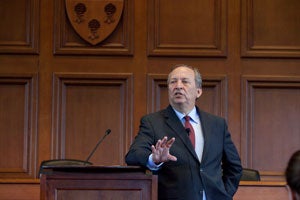Former Harvard President and recent director of the White House National Economic Council Lawrence H. Summers stressed the importance of reducing the nation’s unemployment rate and bringing government spending and revenue into greater alignment, at a talk hosted by the Harvard Law School Forum on April 12, 2011.
Summers, who returned to Harvard at the end of 2010, argued the government’s first priority going forward is to lower the unemployment rate of near 9 percent to position the economy for continued growth.
Summers emphasized the importance of reining in the U.S. deficit over the medium term as well as containing risks associated with the financial system to prevent another financial crisis from happening again.
“The threat is of the kind of general demoralization and loss of public confidence in public institutions that we have seen in a number of states, in which a government promises more and more to a citizenry that becomes more and more disillusioned,” Summers said of the nation’s unsustainable budget deficit.
Summers, who is co-teaching an undergraduate course on American economic policy this semester, outlined the government’s response to the 2008 financial crisis at the event.
Alluding to criticisms that have been levied against the Obama administration’s response to the financial crisis, Summers defended and explained the government’s measures to stimulate spending and provide support for the financial system and specific sectors such as the automobile industry and housing market.
“The view was we better make the mistake of doing too much than make the mistake of doing too little,” Summers said. “President Obama recognized that it is the central irony of financial crises that they are caused by too much confidence, too much lending, too much spending, and that they are resolved by more confidence, more spending, and more lending.”
Summers argued the most efficient way to stimulate spending is to avoid the spending cuts governments tend to turn to first in times of economic stress, adding that Obama’s team had wanted to pass an even larger stimulus bill that Congress rejected.
“One of the great lies in America is shovel-ready,” Summers said. “You can spend as much as you can on infrastructure but it won’t be enough. That’s why we provided much support to state and local governments, private sector investment, and American households most likely to spend money.”
Summers characterized the Obama’s administration’s response to the financial systems as a departure from the Bush administration’s strategy, which he said treated financial institutions the same regardless of how healthy they were.
“What was important was a commitment to transparency through stress tests in the major financial institutions, a clear sign that their uncontrolled failure would not be permitted again,” Summers said. “Frankly, the success of what took place has exceeded what even optimists expected, as all the money the government infused has now come back at a substantial profit.”
While Summers argued the government’s support for the automobile industry was a success, he acknowledged that the administration’s efforts at mortgage relief to address the downward spiral in the housing market were less successful.
“It has to be said that the effect of public policy on the housing market has been substantially less, and the markets appear relatively vulnerable today,” he said.
Summers peppered his talk with self-deprecating humor referencing the controversies surrounding his tenure as University President, quipping that he told President Barack Obama ’91 he was “one of the few people to enter his administration to get out of politics.”
“I prefer looking forward rather than backwards,” Summers said in response to a question about his presidency. “I am glad to be back at the university.”
